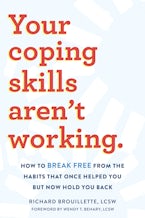Problem
If you have a client who shows a flash of anger about exploring a particular subject, or discussing home practice, this initial show of temper can devolve into a power struggle if it isn’t managed with a sensitive tone.
Self-Talk
A self-talk approach, using elements of schema therapy and chairwork, focuses on the angry or impulsive reaction as just one part of the client’s self. The therapist helps the client express their point of view about what it’s like to live with this impulsive part.
This simple technique accomplishes three powerful tasks:
- Client names the impulsive part
- Client identifies with the self that is not the impulsive part (healthy part)
- Healthy part becomes a partner for the therapist with cognitive behavioral therapy (CBT) exercises
Example
Therapist: You’re kind of grumpy about talking this week? Not interested?
Client: Yeah, I don’t really see the point.
Therapist: What kinds of feelings are you having about it?
Client: I’m frustrated. Angry I guess, like, why do I have to do this?
Therapist: I know last week there was a different you, a hopeful you. What do you think hopeful you would say about the you who is here today?
Client: This happens a lot. I get moody and upset about having to do this work.
Therapist: And so, this moody part doesn’t help?
Client: At the end of the day, no.
Therapist: So, what would you say to the moody part about this?
Client: You really don’t need to be this way.
Therapist: I actually get why she’s so moody about doing this work. She gets tired of it. She wishes she could let it go. I understand and respect that. But you’re right. Maybe we could tell her she can be moody another time? After the therapy is over?
Result
Once you’ve established this connection with your client’s healthy part, you have a grounding from which you can partner on CBT work.
Richard Brouillette, LCSW, is a certified schema therapist who works with entrepreneurs, creatives, and professionals seeking to overcome anxiety, find fulfillment, and improve their relationships. Brouillette has been published in The New York Times and PsychCentral, and is a Psychology Today expert opinion blogger. Brouillette is a former Secretary of the Executive Board of the International Society for Schema Therapy.



